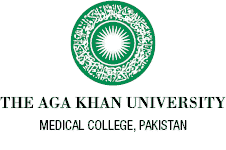Elective Programme
AKU Medical College accepts applications for elective programmes from national and international medical students. Students who are currently studying in high school or at an equivalent level, and are interested in pursuing a career in medicine, may also apply to the programme.
Learning Objectives
- Learn and advance the knowledge of medical disorders in the areas they are rotating
- Enhance the communication skills critical to patient care, including direct communication with patients and families; documentation skills; verbal and written communication with other physicians including sign out/patient handoffs; communication with non-physician team members; and participation in discharge planning.
- Demonstrate accurate and detailed history taking and its documentation
- Enumerate a broad list of differential diagnosis for the patient they are assigned
- Identify appropriate diagnostic tests for each indication
- Learn and formulate management plan for uncomplicated and complicated disorder
- Strengthen the skills associated with life-long learning and the practice of evidence- based medicine e.g., reading and interpreting the medical literature and medical informatics.
- Identify the relationship between medical and socioeconomic problems, and recognize the importance of the impact of culture on health beliefs and medical care.
- Be familiar with the multidisciplinary approach involving various medical and surgical sub-specialties working together for a unified plan for the patient
- Provide patient education and counseling at an appropriate level of comprehension and sensitivity.
Expectations for Visiting Medical Students
- Students will be expected to round daily in the ward with the team while doing inpatient rotation
- Punctuality is expected, and during ward rounds they should work with the hospital team
- Students will attend outpatient clinics and clerk patients under supervision
- Attend didactic lectures and journal clubs
- Encouraged to present a case they saw in the clinic or hospital during their rotation
- Always observe the principles of empathic communication with families


